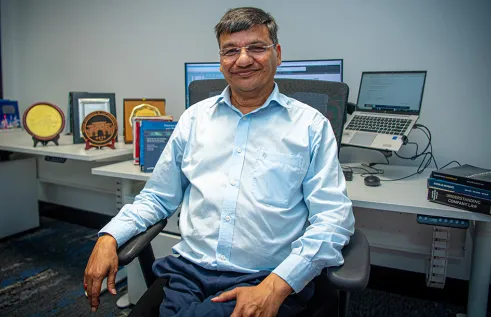Research impact
From a desk in Darwin to global impact: Dr Rakesh Gupta leads research on market integration and economic connectivity

Dr Rakesh Gupta’s desk at Charles Darwin University is rather unremarkable to look at.
There are lots of books, and even more of them at his home in boxes. In front of his chair is a computer running complex software that helps with statistical and economic analysis.
There’s also a coffee cup. According to Dr Gupta, an Associate Professor in Accounting and Finance at CDU’s Faculty of Arts and Society, a drink without caffeine in it doesn’t count as a beverage.
It’s from this desk that Dr Gupta has grown to become a world-recognised authority in analysing global markets.
How big a force? He’s risen to become the most cited academic at CDU, with his insights quoted in more than 2,800 publications.
Putting it simply, Dr Gupta’s research out of CDU looks at how countries and their stock markets are becoming more globally connected, and searches for the reasons behind the trends.
He investigates factors such as environmental policies, education, trade and politics, and assesses how companies are managed to help identify what brings economies closer together.
And his research keeps him very much in demand.
Global, not local
According to Dr Gupta, when economies and markets are connected, a problem in one country can affect people worldwide – something he points out that we’re all feeling right now. It’s like when the US sneezes, the world catches a cold.
“As stock markets and national economies become increasingly interdependent, the ripple effects of financial shocks, policy shifts, or geopolitical events are no longer confined within borders – they affect livelihoods, stability, and development across the globe,” he says.
“We have seen this from the standpoint of so-called reciprocal tariffs being imposed by US President Donald Trump.”
Trump has recently sparked a global trade war as he attempts to counter what he claims are unfair trade practices inflicted on the US by other countries, including Australia, in the form of taxes on foreign goods brought into the US.
The fallout from the move has sent shockwaves across financial markets worldwide as investors and businesses scramble to work out how to respond to concerns over rising inflation and fears of a global recession.
“Globalisation reduces poverty, facilitates innovation and technology transfer, improves individual freedoms and strengthens democracy,” Dr Gupta says. “Tariffs will do exactly the opposite; impede innovation, limit individual freedoms and weaken democracy.”
Connecting economies
Dr Gupta says his fascination with stock markets grew from his curiosity about understanding the forces driving markets and questions over whether investing was truly speculative and of no benefit to society.
“Over time, this interest deepened into an academic pursuit, driven by the desire to uncover how financial systems operate not just as mechanisms of wealth creation, but as integral components of global economic development,” he says.
The deeper he dived into market behaviours, the more intrigued he became with how migrants, environmental, social and governance (ESG) factors, trade and even education all play a part in connecting economies.
“This intersection of personal motivation and intellectual inquiry continues to drive my research – grounded in a belief that financial systems, when better understood, can be harnessed for broader societal benefit,” Dr Gupta says.
Most of Dr Gupta’s work takes place behind his desk. He critically monitors the world, looking at everything from business news to global politics and even drawing on interactions with his students.
“These real-world insights continually inform and shape the direction of my academic inquiry,” he says.
Marketing the future
Dr Gupta says he ultimately wants to help people see stock markets not just as places to make money, but as an important part of global development.
He believes that this, in turn, could help create economic policies that are fairer and more helpful to everyone rather than just deepening existing inequalities.
“From a societal perspective, I hope my research can shift the perception of stock markets from being seen merely as speculative arenas to being understood as mechanisms with the potential for contributing to inclusive economic growth,” he says.
“By highlighting how governance, education, and migration shape investment flows and market behaviour, this work can inform more equitable policy frameworks and support initiatives that align financial activity with social progress.”
Dr Gupta says CDU is a great place to be part of global-level research while working closely with leading academics.
“Charles Darwin University, while regional in its geographic location, offers world-class research opportunities and mentorship for emerging scholars,” he says.
“In the field of market integration, for instance, the United States leads in terms of global influence, and China contributes the highest volume of research.”
But it's Charles Darwin University's Dr Rakesh Gupta who is making headlines as the field’s most influential author.
To find out more about Dr Rakesh Gupta’s research or to make an inquiry about supervised postgraduate research, including Higher Degree by Research, visit the CDU research web portal.
Related Articles

Yuvraj Pokhrel: A journey of purpose, passion and progress
A scholarship brought Yuvraj Pokhrel from Nepal to CDU to study for an MBA. This life-changing opportunity, born from a partnership with anti-trafficking support group Maiti Nepal, has inspired him to dedicate his future to giving back and empowering others.
Read more about Yuvraj Pokhrel: A journey of purpose, passion and progress
The business student with big dreams of her own NGO
Etabez is studying a Bachelor of Business at Charles Darwin University. Her two best friends are studying completely different degrees in medicine and law. What binds them together is a pact made in childhood.
Read more about The business student with big dreams of her own NGO
The ultimate CDU experience: Courtney's story
If university is a chocolate box, Courtney did her best to sample every flavour of CDU. She studied on campus when living in Darwin, studied online when interstate, studied abroad in Norway for the experience of a lifetime, and even picked up an internship as a student that helped her hit the ground running in her career.
Read more about The ultimate CDU experience: Courtney's story

